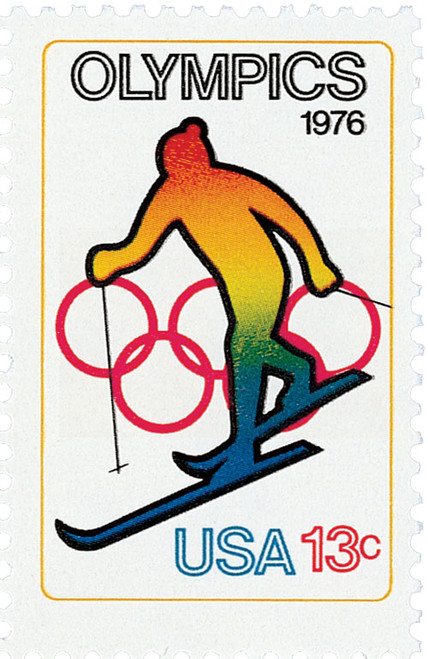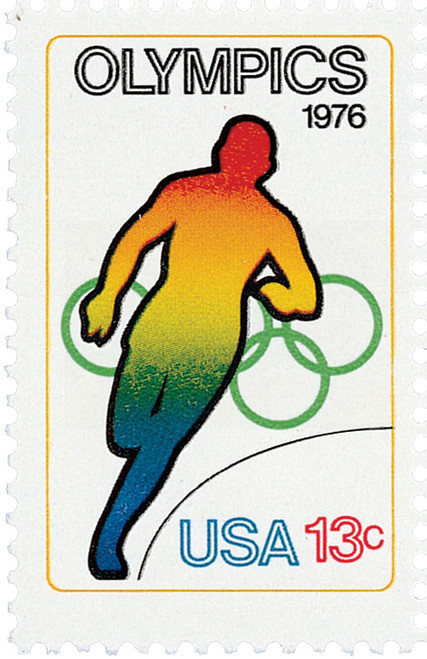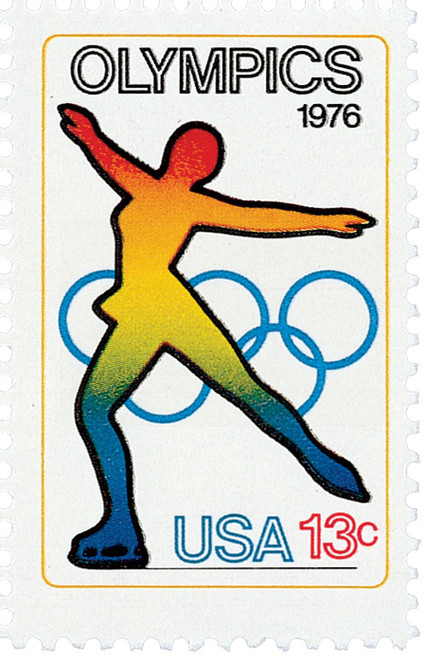
# 1695-98 FDC - 1976 13c Olympic Games
Set of 4
Opening Of The 1976 Summer Olympics

On July 17, 1976, Queen Elizabeth II presided over the opening ceremonies of the Games of the XXI Olympiad in Montreal, Quebec, Canada.
Montreal was selected as the host city for the 1976 Olympics at a meeting of the International Olympic Committee in 1970. This marked the first and only Summer Olympics in Canada.

The opening ceremony was held on Saturday, July 17, 1976, at the Olympic Stadium in Montreal. An audience of 73,000 attended the ceremonies, while another 500 million watched from home. The ceremony included an air show by the Canadian Forces Air Command’s Snowbirds. Then at 3:00 pm, Queen Elizabeth II arrived to a trumpet fanfare and an orchestral performance of “O Canada.”
The parade of athletes then circled the stadium followed by a dance performance by 80 women (to mark the 80th anniversary of the revival of the Olympic Games). A series of speeches followed, after which Queen Elizabeth declared the games officially opened. She made the declaration in English and French, the two languages of the host country.
Next, the Olympic Flag was brought in to the Olympic Hymn. It was carried by eight men and hoisted by four women, representing the ten provinces and two territories of Canada at the time. A series of dance performances followed, plus cannon fire and the release of doves.

The Olympic Flame was transmitted electronically via satellite from Athens to Ottawa by an electronic pulse created from the actual burning flame. It was carried by hand from Ottawa to Montreal. A few days after the start of the games, a rainstorm extinguished the flame, which was then relit by an Olympic official with his cigarette lighter. Olympic organizers immediately put the fire out and relit it with a backup of the original flame.
The amazing performance of Rumania’s 14-year-old Nadia Comaneci in gymnastics at these games earned her three gold medals and the first perfect score (10.0) in Olympic history.
Queen Elizabeth II’s daughter, Princess Anne, competed with the British equestrian (horseback riding) team.

Cuba’s Alberto Juantorena became the first man to win the 400-meter and 800-meter in the same Olympics.
American Jim Montgomery became the first person to break the 50-second mark in the 100-meter freestyle.

Caitlyn Jenner (then Bruce Jenner) set a world record of 8,618 points after winning the gold medal for the decathlon.
Canada’s Alex Oakley became the oldest track and field athlete to compete in the Olympics at the age of 50.
Cuban runner, Alberto Juantorena, became the first man to win both the 400-meter and 800-meter races in the same Olympics.
The US sent one of their greatest boxing teams in history – Sugar Ray Leonard, Leon Spinks, Michael Spinks, Howard Davis Jr, and Leo Randolph. Each boxer won a gold medal, and all but Davis went on to become professional world champions.
The hosting country, Canada, left the games with just five silver and six bronze medals. This was the first and only time that the host country of the Summer Olympic Games didn’t win any gold medals.
Set of 4
Opening Of The 1976 Summer Olympics

On July 17, 1976, Queen Elizabeth II presided over the opening ceremonies of the Games of the XXI Olympiad in Montreal, Quebec, Canada.
Montreal was selected as the host city for the 1976 Olympics at a meeting of the International Olympic Committee in 1970. This marked the first and only Summer Olympics in Canada.

The opening ceremony was held on Saturday, July 17, 1976, at the Olympic Stadium in Montreal. An audience of 73,000 attended the ceremonies, while another 500 million watched from home. The ceremony included an air show by the Canadian Forces Air Command’s Snowbirds. Then at 3:00 pm, Queen Elizabeth II arrived to a trumpet fanfare and an orchestral performance of “O Canada.”
The parade of athletes then circled the stadium followed by a dance performance by 80 women (to mark the 80th anniversary of the revival of the Olympic Games). A series of speeches followed, after which Queen Elizabeth declared the games officially opened. She made the declaration in English and French, the two languages of the host country.
Next, the Olympic Flag was brought in to the Olympic Hymn. It was carried by eight men and hoisted by four women, representing the ten provinces and two territories of Canada at the time. A series of dance performances followed, plus cannon fire and the release of doves.

The Olympic Flame was transmitted electronically via satellite from Athens to Ottawa by an electronic pulse created from the actual burning flame. It was carried by hand from Ottawa to Montreal. A few days after the start of the games, a rainstorm extinguished the flame, which was then relit by an Olympic official with his cigarette lighter. Olympic organizers immediately put the fire out and relit it with a backup of the original flame.
The amazing performance of Rumania’s 14-year-old Nadia Comaneci in gymnastics at these games earned her three gold medals and the first perfect score (10.0) in Olympic history.
Queen Elizabeth II’s daughter, Princess Anne, competed with the British equestrian (horseback riding) team.

Cuba’s Alberto Juantorena became the first man to win the 400-meter and 800-meter in the same Olympics.
American Jim Montgomery became the first person to break the 50-second mark in the 100-meter freestyle.

Caitlyn Jenner (then Bruce Jenner) set a world record of 8,618 points after winning the gold medal for the decathlon.
Canada’s Alex Oakley became the oldest track and field athlete to compete in the Olympics at the age of 50.
Cuban runner, Alberto Juantorena, became the first man to win both the 400-meter and 800-meter races in the same Olympics.
The US sent one of their greatest boxing teams in history – Sugar Ray Leonard, Leon Spinks, Michael Spinks, Howard Davis Jr, and Leo Randolph. Each boxer won a gold medal, and all but Davis went on to become professional world champions.
The hosting country, Canada, left the games with just five silver and six bronze medals. This was the first and only time that the host country of the Summer Olympic Games didn’t win any gold medals.


























